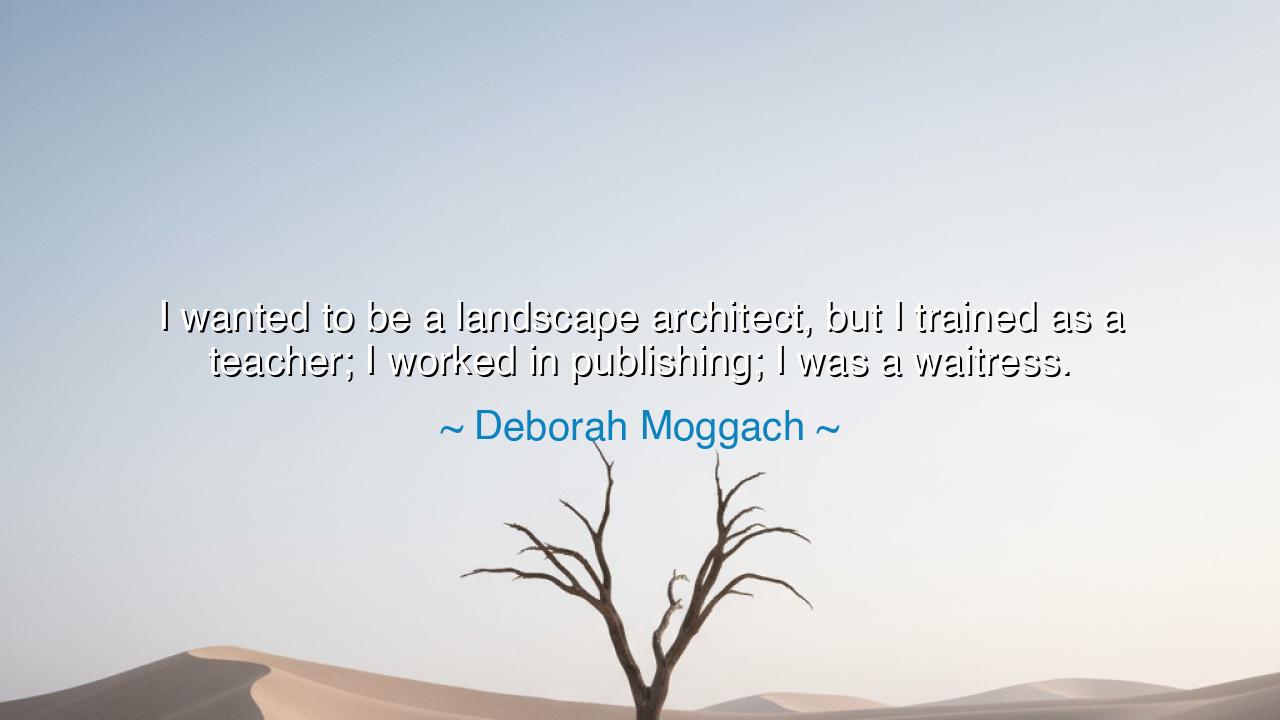
I wanted to be a landscape architect, but I trained as a
I wanted to be a landscape architect, but I trained as a teacher; I worked in publishing; I was a waitress.






Deborah Moggach, in reflecting upon the winding road of her life, once said: “I wanted to be a landscape architect, but I trained as a teacher; I worked in publishing; I was a waitress.” These words, plain yet profound, are a testament to the unpredictable nature of human journeys. In them lies the quiet wisdom that our lives are not forged by a single calling alone, but by the many roles, trials, and paths we walk along the way. Her voice reminds us that identity is not fixed, and destiny is often shaped by detours as much as by intentions.
The meaning of this statement speaks to the restless and adaptive nature of the human spirit. We set our eyes upon one path — in her case, the vision of landscape architecture, to shape and beautify the earth — but life often redirects us, demanding new roles: teacher, to guide others; publisher, to spread voices and ideas; waitress, to serve with humility and earn sustenance. Each step, though different in form, is not wasted; each carries lessons, disciplines, and insights that together build the mosaic of a full life.
The origin of such wisdom lies in the shared experience of countless souls who dreamed one thing and lived another, and yet discovered in those turns the seeds of growth. The ancients spoke of fate not as a straight line, but as a woven thread, sometimes twisted, sometimes knotted, but always purposeful. Moggach’s words echo this ancient truth: that our lives are crafted not by perfection of plan, but by resilience and openness to change.
History gives us vivid examples. Consider Charles Darwin, who began his journey not as a scientist but as a failed medical student, later studying theology, before embarking on the voyage that revealed to him the secrets of evolution. Or Maya Angelou, who worked as dancer, actress, cook, and journalist, long before her voice blossomed into one of the most profound in literature. Like Moggach, they reveal that the greatness of a life does not depend on rigid adherence to a single path, but on the courage to learn from every station along the way.
In her admission of being a waitress, there is no shame, but rather humility. For even the simplest labor, when embraced with honesty, contributes to the shaping of character. Service, struggle, and labor in obscurity often prepare the heart for greater works. To serve at tables is to learn patience; to work in publishing is to handle the weight of words; to teach is to guide the young. None of these experiences are wasted. Together, they enriched Moggach’s perspective and lent depth to her craft as a writer.
The lesson for future generations is radiant: do not fear the winding road. Your destiny is not undone by detours, nor diminished by work that seems unconnected to your dream. Every task, whether grand or humble, is a preparation, shaping your spirit, refining your patience, and equipping you with wisdom. Life’s value does not lie in the perfection of the path, but in the richness of what you carry from each step.
Practical action must follow. If you find yourself on a path you did not plan, embrace it. Ask what lessons it offers, what strength it builds, what wisdom it conceals. Do not despise small beginnings or humble work, for they are teachers in disguise. And remember always: the dream may change, or it may be fulfilled later through means you cannot yet see. Walk each step with dignity, for each role contributes to the fullness of who you are becoming.
Thus, Deborah Moggach’s words stand as both confession and counsel: life is not one straight calling, but many roles woven into a single story. Do not despair when your road bends; instead, carry forward what you have gained, for even the humblest detour may prepare you for your greatest work. In this, the heart is freed from regret, and the soul learns to find purpose in every chapter of its unfolding tale.






AAdministratorAdministrator
Welcome, honored guests. Please leave a comment, we will respond soon